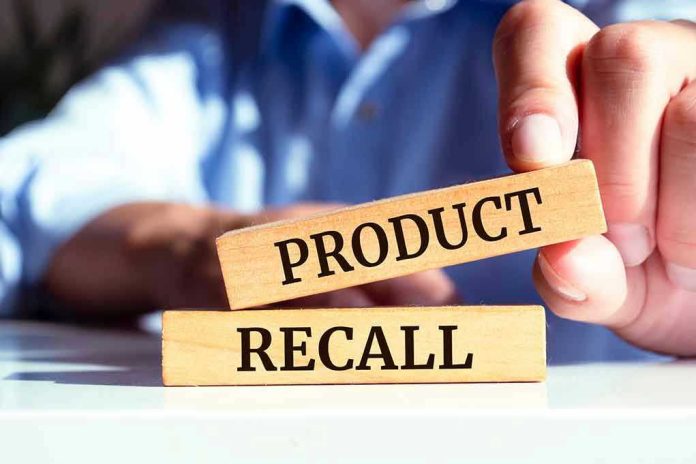
When a boutique formula company with just 1% of the market lands at the center of the nation’s first powdered formula botulism outbreak, every parent and policymaker is left wondering: what did ByHeart know, and when did they know it?
Story Snapshot
- ByHeart infant formula linked to a historic multistate botulism outbreak with 23 cases in 13 states
- The recall covers all unexpired ByHeart products, despite no unopened cans testing positive for contamination
- Regulators and the company acknowledge prior concerns and scrutiny before the outbreak
- Every affected infant was hospitalized, but no deaths have been reported
Botulism Strikes: An Unprecedented Outbreak Tied to Powdered Formula
On August 1, 2025, the first whispers of infant botulism began circulating in pediatric wards across several states. In a country where powdered formula recalls have become background noise, this outbreak set off alarms for a different reason: the culprit wasn’t a massive multinational, but the organic upstart ByHeart. Within weeks, epidemiologists were confronted with an unsettling pattern—a surge in hospitalizations, all with one link in common. By November, 23 infants in 13 states had fallen ill, and federal agencies made an announcement that would send shockwaves through new parents and the formula industry alike.
Investigators at the CDC and FDA zeroed in on ByHeart’s Whole Nutrition Infant Formula after case interviews and lab work revealed a disproportionate number of sick infants had consumed this brand. The FDA, usually slow to single out smaller market players, noted that ByHeart’s products accounted for a stunning share of cases despite representing only 1% of total formula sales. By November 14, the company’s recall expanded to every unexpired lot, a sweeping move that left grocery shelves bare of the once-touted organic formula. No unopened ByHeart cans had tested positive for Clostridium botulinum as of mid-month, but the epidemiological trail was too strong to ignore.
ByHeart’s Prior Warnings and Regulatory Scrutiny
While the recall dominated headlines, a deeper story simmered beneath the surface. ByHeart, eager for credibility in a crowded marketplace, had been under a microscope before the first case surfaced. Regulatory records and internal communications, referenced by health authorities, suggest the company had previously been informed of potential safety gaps. This background—an emerging brand facing heightened expectations—raises uncomfortable questions about risk oversight, especially given the brand’s promise of premium quality and organic sourcing.
Industry experts emphasize the singularity of this event. Dr. Steven Abrams, a leading authority in pediatric nutrition, confirmed that the U.S. had never before seen a botulism outbreak tied to powdered formula. Historically, infant botulism cases are rare and almost always traced to environmental exposure or honey, not commercial food products. The convergence of a small brand, a novel pathogen source, and a spate of serious illnesses forced regulators to rethink assumptions about product safety and the adequacy of current testing standards.
Regulatory Response, Parental Anxiety, and Industry Fallout
The timeline of the outbreak reveals a system on edge. From the first illnesses in August to the public announcement and recall in November, state and federal agencies moved quickly to trace the source, test product samples, and coordinate with ByHeart on recall logistics. The FDA and CDC, acutely aware of the lessons from past formula recalls, prioritized transparency and broad action, even as laboratory confirmation lagged behind the epidemiological signals.
For families, the impact was immediate and gut-wrenching. Every affected infant required hospitalization, a testament to the gravity of botulism’s neuromuscular effects. While, thankfully, no deaths have been reported, the emotional and financial toll on caregivers is substantial. Anxiety has spread beyond ByHeart customers, as parents nationwide question the integrity of formula safety standards and seek reassurance from pediatricians. With ByHeart’s small market share, the national supply chain remained stable, but the reputational damage to the company and the broader organic/niche formula sector may prove lasting.
What Happens Next: New Standards or Business as Usual?
As the investigation moves into its next phase, the formula industry is bracing for aftershocks. Laboratory testing of leftover formula continues, and the possibility remains that unopened cans could eventually yield positive results. Regardless of final lab outcomes, the FDA’s and CDC’s actions signal a new, more aggressive approach to outbreak management—one that may set a precedent for how regulators and companies handle rare but severe risks.
For ByHeart, the challenge now extends beyond the recall. Legal exposure, eroded consumer trust, and the specter of increased regulatory scrutiny will shape the company’s future, along with the fate of other small formula makers. American families, meanwhile, are left to decide whether the promise of boutique nutrition is worth the newly uncovered risks. The open question: Will this outbreak spark meaningful change, or simply fade into the long list of food safety scares? Only time—and the next round of lab results—will tell.
Sources:
FDA outbreak investigation update
FDA outbreak investigation report
Washington Department of Health update

